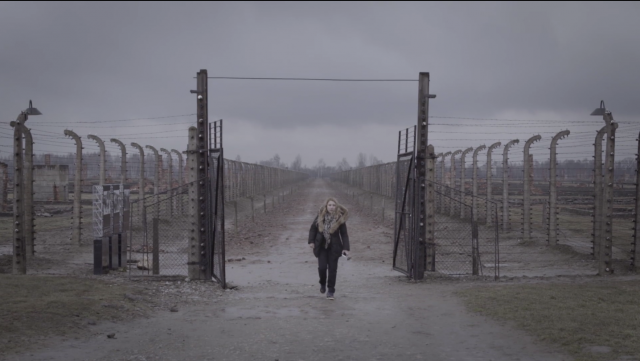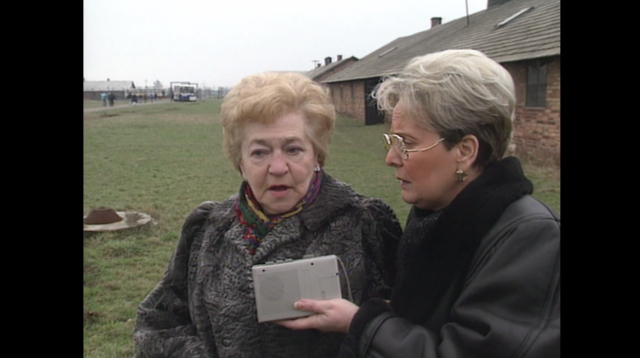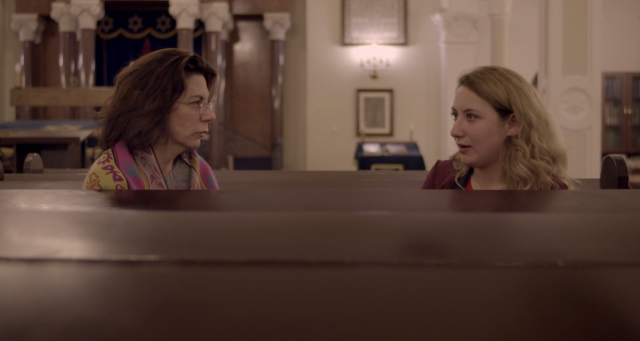
Serena Dykman retraces her grandmother’s steps at Auschwitz and elsewhere in Nana
NANA (Serena Dykman, 2017)
Cinema Village
22 East 12th St. between University Pl. & Fifth Ave.
Opens Friday, April 13
212-529-6799
www.nanafilm.com
www.cinemavillage.com
 According to a disturbing new survey published this week by the Conference on Jewish Material Claims Against Germany and conducted by Schoen Consulting, twenty-two percent of millennials have never heard of the Holocaust, while fifty-eight percent of Americans believe that “something like the Holocaust could happen again.” The report was released just in time for Yom Hashoah, Holocaust Remembrance Day. At least one millennial is doing something about that. On April 13, Serena Dykman’s extraordinary documentary, Nana, opens at Cinema Village, where the twenty-five-year-old first-time full-length feature director will participate in Q&As following the 7:00 screenings on Friday and Saturday. When she was a child, Serena had heard such words as “Holocaust,” “Auschwitz,” and “Mengele” but didn’t know exactly what they meant, though she knew they had something to do with her grandmother, Maryla Michalowski-Dyamant, whom she called Nana and who died when Serena was eleven. A decade later, after being in Brussels during the attack on the Jewish Museum and in Paris during the Charlie Hebdo massacre, Serena decided it was time to read the book she had been carrying around with her for two years but had been reluctant to open: her grandmother’s memoir. She then finally understood what all those words meant, and the impact they continue to have on her and her mother, Alice Michalowski, Maryla’s daughter.
According to a disturbing new survey published this week by the Conference on Jewish Material Claims Against Germany and conducted by Schoen Consulting, twenty-two percent of millennials have never heard of the Holocaust, while fifty-eight percent of Americans believe that “something like the Holocaust could happen again.” The report was released just in time for Yom Hashoah, Holocaust Remembrance Day. At least one millennial is doing something about that. On April 13, Serena Dykman’s extraordinary documentary, Nana, opens at Cinema Village, where the twenty-five-year-old first-time full-length feature director will participate in Q&As following the 7:00 screenings on Friday and Saturday. When she was a child, Serena had heard such words as “Holocaust,” “Auschwitz,” and “Mengele” but didn’t know exactly what they meant, though she knew they had something to do with her grandmother, Maryla Michalowski-Dyamant, whom she called Nana and who died when Serena was eleven. A decade later, after being in Brussels during the attack on the Jewish Museum and in Paris during the Charlie Hebdo massacre, Serena decided it was time to read the book she had been carrying around with her for two years but had been reluctant to open: her grandmother’s memoir. She then finally understood what all those words meant, and the impact they continue to have on her and her mother, Alice Michalowski, Maryla’s daughter.

Maryla Michalowski-Dyamant tells her amazing story of survival in documentary by her granddaughter
Nana is a deeply personal transgenerational documentary that focuses on Maryla’s remarkable story of surviving Ravensbruck, Malchow, and Auschwitz-Birkenau, serving as a translator for Dr. Josef Mengele, the Angel of Death, and going on to share her tale in an endless stream of interviews, school visits, and tours at Auschwitz, making sure that the world will never forget what happened. Once word got out that Maryla’s granddaughter was making a film about her, Serena received more than a hundred hours of footage from men and women who had interviewed her grandmother in television studios, at her home, and at Auschwitz, to go along with the new material she was filming. Serena and Alice retrace Maryla’s steps, traveling to Belgium, Poland, Germany, France, and Brooklyn, meeting with people who knew Maryla and reading excerpts from her memoir outside relevant historic locations. Maryla’s legacy is apparent as person after person speaks of her dedication to her cause, her sense of humor, and the matter-of-fact way she related her experiences — and her fears that anti-Semitism and intolerance were on the rise again. “I tell this to the youth so they understand everything that can happen if we adhere to regimes like the Hitlerian regime and others,” Maryla says. Television reporter Yvan Sevanans explains, “We have to constantly restart the work because there are constantly new generations.”
“Malevolent politicians still exist. Political manipulators like Hitler still exist. And even in the most democratic countries, we’re never shielded from a bad election,” notes journalist Christian Laporte, who visited Auschwitz with Maryla. “I’m really scared. These days, I’m scared,” says library director Joelle Baumerder, who also went to Auschwitz with Maryla and is the daughter of survivors. German-born professor Johannes Blum, who was the first one to record Maryla’s story, asks, “How does this woman find the strength to live? How is it possible? I’d even say that she passed on this strength to others. She knows the cost of life. And she knows the richness of life.” Alice herself explains how hard it is to be the child of a survivor. “It takes away from you the full right to live. You want to trust people, and to trust life. But you know that this is impossible,” she says. Serena, who graduated from NYU film school and has made several shorts (Welcome, The Doorman), and editor Corentin Soibinet potently move between the interviews with Maryla, Alice and Serena’s journey, the new interviews, and archival footage of ghettos and concentration camps from the 1930s and 1940s. One word that keeps coming up when people describe Maryla is “tolerance”; Maryla was adamant about not making the Holocaust a Jewish thing but instead about discrimination against any group.

Mother and daughter join together to keep telling Holocaust stories to the next generations in Nana
But at the heart of the film, which was written by Dykman, David Breger, and Soibinet and has a lovely, emotive score by Carine Gutlerner, is the relationship among three generations of strong, determined women, Maryla, Alice, and Serena. Sitting in the last remaining synagogue in Warsaw, Alice asks her daughter what her first impressions are of what she’s encountered while making the film, and Serena replies, “That I hadn’t understood too much . . . Or that I didn’t want to understand. I’ve learned more in ten days about Nana and the Shoah than I learned in all twenty-two years of my life.” Alice also tells her daughter, “She survived so you don’t have to. And so that you can live.” Maryla was initially compelled to speak her mind after hearing too many Holocaust deniers claim the genocide never happened. Serena is now keeping her grandmother’s legacy alive at a time when there are fewer and fewer survivors and witnesses and more and more white supremacists and fascist leaders around the globe. But like her grandmother, Serena is filled with the hope that things can change, and films like Nana, which has won awards at numerous international festivals, need to be made and widely seen to accomplish just that.